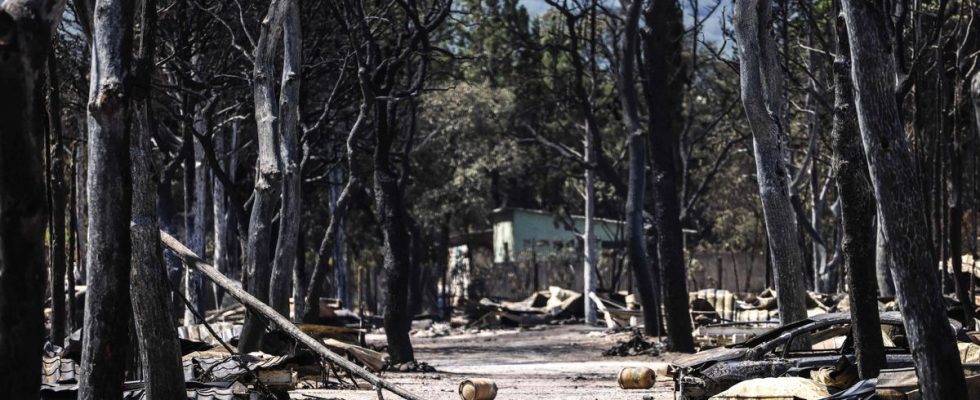“We’re alive, that’s the main thing. In front of the Argelès gymnasium, Laetitia Richard told AFP on Tuesday of her hasty departure from the Red Chênes campsite of Argelès-sur-Mer (Pyrénées-Orientales), ravaged by what is currently the biggest fire of the summer in France. “We were coming back from a walk and we saw the smoke (…) we took what we could and left”, reports this 39-year-old Vendean, who came with her husband and two children to spend holidays on the coast. Mediterranean after having lived, from a little further, the fires of Gironde last year.
His family is not the only one to have seen, as Antoine Parra, the mayor of Argelès says, his “good weather turn into a nightmare”. Some 3,000 people, mostly vacationers, were evacuated on Monday as the flames spread. And if most were able to quickly return to their campsite, 300 remain this Wednesday housed in communal rooms while waiting to return home.
Firefighters still on the scene
The fire was able to be “fixed, stabilized” overnight from Monday to Tuesday, but 220 firefighters continued to monitor it on Wednesday, watering the pine forests or burnt buildings to prevent any resumption of fire. The disaster is still “far from being closed”, specifies this Wednesday the Departmental Fire and Rescue Service of the Pyrénées-Orientales (Sdis 66) whose operations will continue at least until Thursday morning, with the support firefighters from Hérault and Bouches-du-Rhône.
In total, this fire, which broke out late Monday afternoon about twenty kilometers southeast of Perpignan, covered around 500 hectares in the municipalities of Argelès, Saint-André and Sorède. In addition to the destruction of the Chênes Rouges campsite, the flames affected “about thirty houses and entered eight of them”, according to a report by the prefect Rodrigue Furcy.
A risk of fire still “severe” in the department
There were no casualties among the population. But, according to Civil Security, 19 firefighters were slightly affected after inhaling the fumes, a twentieth was more seriously injured during a fall and hospitalized.
An investigation has been opened to determine the origin of the fire, no lead being privileged to date.
Surveillance is also reinforced on Wednesday in the rest of the department, in particular in the Albères massif, on the border with Spain, “at severe risk” of fire. The Pyrénées-Orientales are the French department most affected by the drought. The fire risk is very high there, recalls the prefect, noting “several fire starts per day”.

